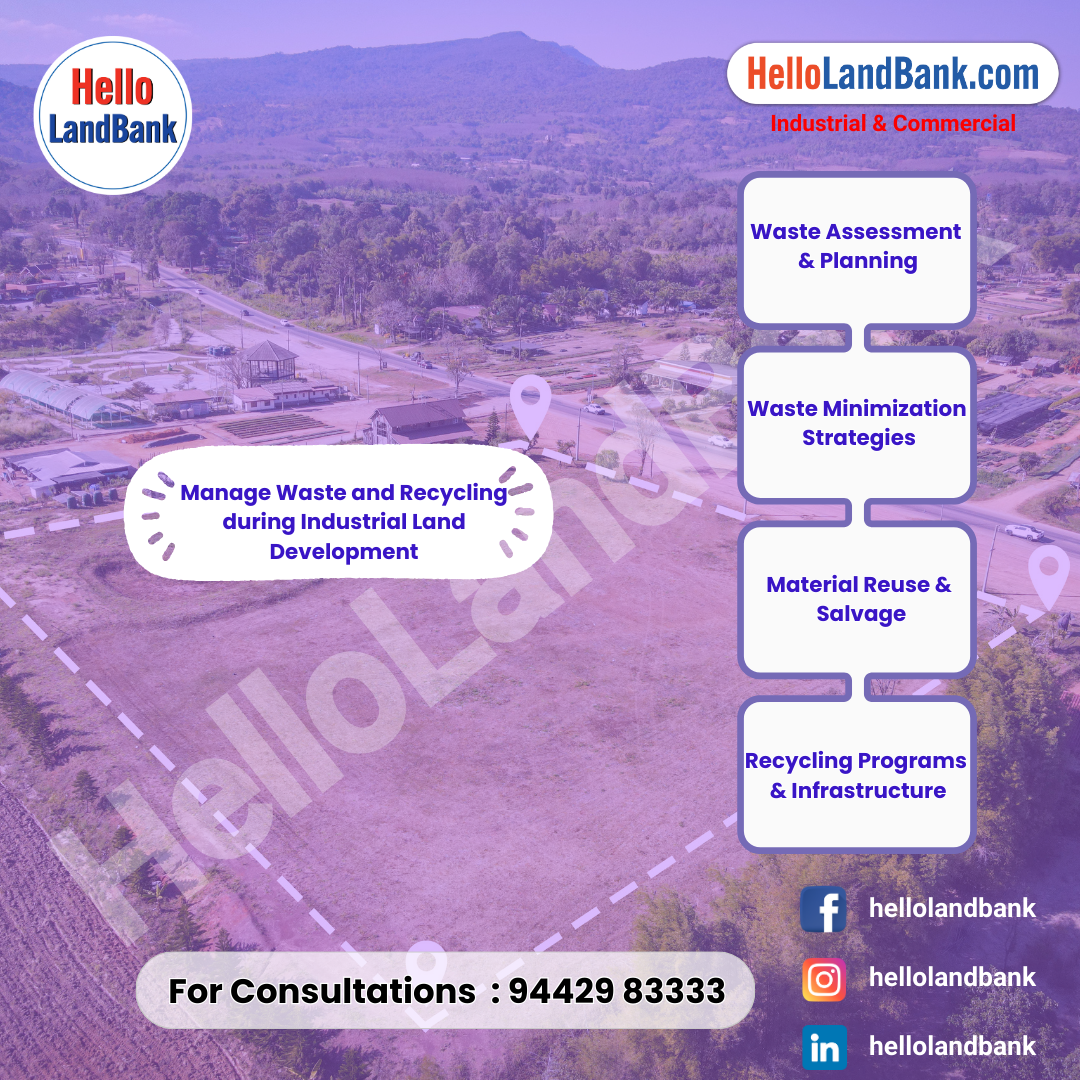Managing waste and recycling during industrial land development involves implementing strategies, practices, and systems to minimize waste generation, maximize recycling and reuse opportunities, and ensure environmentally responsible management of construction and demolition materials. Here are steps to effectively manage waste and recycling during industrial land development:
1. Waste Assessment and Planning:
- Conduct a waste assessment to identify the types, quantities, and sources of waste generated during industrial land development activities. Assess construction and demolition waste streams, including concrete, asphalt, wood, metal, plastics, packaging materials, and hazardous substances. Develop a waste management plan outlining goals, objectives, and strategies for waste reduction, recycling, and disposal throughout the project lifecycle.
2. Waste Minimization Strategies:
- Implement waste minimization strategies to reduce waste generation at the source and promote efficient use of materials during construction, demolition, and site preparation activities. Optimize material procurement practices, construction techniques, and design specifications to minimize excess materials, packaging waste, and construction debris. Use prefabricated components, modular construction methods, and just-in-time delivery to reduce material waste and minimize on-site storage requirements.
3. Material Reuse and Salvage:
- Identify opportunities for material reuse and salvage to divert reusable materials from the waste stream and promote circular economy principles. Salvage materials such as lumber, steel, concrete, and fixtures from demolished structures for reuse in new construction projects or for resale in salvage markets. Establish salvage and reuse programs to recover valuable materials and extend their lifespan through repurposing, refurbishment, or recycling.
4. Recycling Programs and Infrastructure:
- Implement recycling programs and infrastructure to separate, collect, and recycle construction and demolition materials generated during industrial land development activities. Provide on-site recycling containers, bins, and sorting facilities for segregating recyclable materials such as concrete, asphalt, metals, wood, cardboard, plastics, and inert debris. Partner with local recycling facilities, waste haulers, and material recovery facilities (MRFs) to recycle recovered materials and divert them from landfills.
5. Hazardous Waste Management:
- Manage hazardous materials and waste generated during industrial land development activities in compliance with environmental regulations and safety standards. Identify hazardous substances such as asbestos, lead-based paint, mercury-containing devices, and chemical pollutants that require special handling, containment, and disposal procedures. Implement hazardous waste management practices, worker training programs, and environmental controls to prevent exposure, spills, and contamination risks associated with hazardous materials.
6. Construction Waste Separation and Segregation:
- Implement waste separation and segregation practices to categorize construction and demolition materials into distinct waste streams for recycling, reuse, or disposal. Use color-coded containers, labels, and signage to differentiate waste categories such as concrete, metal, wood, cardboard, plastics, and hazardous materials. Train workers, contractors, and subcontractors on proper waste sorting techniques and waste management protocols to ensure compliance with recycling requirements and minimize contamination of recyclable materials.
7. Waste Tracking and Documentation:
- Track and document waste generation, recycling rates, and disposal activities throughout the industrial land development project to monitor progress, measure performance, and demonstrate compliance with waste management objectives. Maintain accurate records of waste quantities, recycling volumes, diversion rates, and disposal methods for reporting purposes, regulatory compliance, and sustainability certifications.
8. Environmental Compliance and Permitting:
- Ensure compliance with environmental regulations, permitting requirements, and waste management standards applicable to industrial land development projects. Obtain necessary permits, approvals, and clearances from regulatory agencies for waste handling, recycling operations, and disposal activities. Implement pollution prevention measures, environmental controls, and mitigation strategies to minimize environmental impacts associated with waste generation and management.
9. Stakeholder Engagement and Education:
- Engage stakeholders, project participants, and local communities in waste management and recycling initiatives to raise awareness, foster cooperation, and promote sustainable practices. Educate workers, contractors, and subcontractors on waste reduction strategies, recycling best practices, and environmental stewardship principles through training programs, workshops, and outreach efforts. Encourage community involvement, volunteerism, and participation in recycling events, clean-up activities, and waste reduction campaigns to support collective efforts in managing waste responsibly and conserving natural resources.
10. Continuous Improvement and Evaluation:
- Continuously monitor, evaluate, and improve waste management and recycling practices throughout the industrial land development project lifecycle. Conduct regular waste audits, performance assessments, and post-project reviews to identify opportunities for optimization, innovation, and efficiency gains in waste reduction, recycling, and resource recovery. Implement lessons learned, best practices, and feedback mechanisms to refine waste management strategies, enhance sustainability performance, and drive continuous improvement in waste and recycling practices for future industrial land development projects.
By following these steps and implementing effective waste management and recycling practices, industrial land developers can minimize environmental impacts, conserve resources, and promote sustainable development while achieving project objectives and regulatory compliance. Effective waste management is essential for mitigating environmental risks, reducing project costs, and enhancing the long-term environmental and social sustainability of industrial land development projects.




